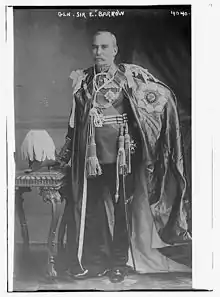Edmund Barrow
General Sir Edmund George Barrow GCB KCMG (28 January 1852 – 3 January 1934) was a senior British Army officer who went on to be Military Secretary to the India Office.[1]
Sir Edmund Barrow | |
|---|---|
 Barrow in 1916 | |
| Born | 28 January 1852 British India |
| Died | 3 January 1934 (aged 81) Milestown, Castlebellingham, County Louth, Ireland |
| Allegiance | |
| Service/ | |
| Years of service | 1871–1919 |
| Rank | General |
| Commands held | Hong Kong Regiment 1st (Peshawar) Division Southern Army, India |
| Battles/wars | Second Anglo-Afghan War Anglo-Egyptian War Boxer Rebellion World War I |
| Awards | Knight Grand Cross of the Order of the Bath Knight Commander of the Order of St Michael and St George |
Early life and education
Barrow was born in British India to Major-General Joseph Lyons Barrow, R.A., of the Madras Army, and his wife, Alicia. He was educated at Marlborough College and Royal Military College, Sandhurst.[1]
Military career
Barrow was commissioned into the 102nd Regiment of Foot in 1871, at age 19.[2][3] Having joined the Indian Army in 1877, he served in the Second Anglo-Afghan War of 1878 and the Anglo-Egyptian War of 1882.[4] He was a member of the Lockhart Boundary Commission to Chitral, Kafirstan, Hunza and Wakhan in 1885 and the Anglo-Siamese Boundary Commission in 1889.[4] He was made Commanding Officer of the Hong Kong Regiment in 1892,[4] and took part in the Tirah Expedition to the North West Frontier of India in 1897. He was appointed deputy adjutant-general, Bengal Command, on 1 April 1900,[5] but only three months later, in July 1900 was transferred as Chief of Staff for the China Expeditionary Force in response to the Boxer Rebellion,[4] after which he was knighted as a Knight Commander of the Order of the Bath (KCB).[6] He was appointed Secretary to the Military Department of the Government of India in November 1901, with the temporary rank of Major-general whilst so employed,[7] and General Officer Commanding 1st (Peshawar) Division in India in 1904.[4] He was appointed General Officer Commanding the Southern Army in India in 1908.[4]
He served in World War I as Military Secretary to the India Office from 1914.[4] He was appointed a member of the Council of India in 1917 and retired in 1919.[4]
References
- "Obituary: General Sir Edmund Barrow – The Mesopotamian Campaign". The Times. The Times Digital Archive. 5 January 1934. p. 7.
- "No. 23812". The London Gazette. 29 December 1871. p. 5877.
- "Barrow, Lieut.-General Sir Edmund George Barrow". Who's Who. Vol. 59. 1907. p. 102.
- Sir Edmund George Barrow Liddell Hart Centre for Military Archives
- Hart′s Army list, 1901
- "No. 27337". The London Gazette (Supplement). 24 July 1901. p. 4915.
- "No. 27403". The London Gazette. 4 February 1902. p. 718.
| Military offices | ||
|---|---|---|
| Preceded by Sir Archibald Hunter |
GOC-in-C, Southern Army, India 1908 – 1912 |
Succeeded by Sir John Nixon |
| Preceded by Sir Beauchamp Duff |
Military Secretary to the India Office 1914–1917 |
Succeeded by Sir Herbert Cox |